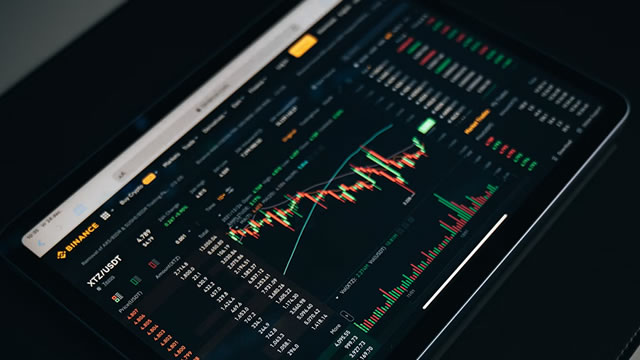Stock Markets Rebound: A Temporary Respite from Tariff-Induced Selloffs
The U.S. stock markets enjoyed a brief respite from the dramatic selloffs that have plagued them in recent trading sessions due to ongoing tariff tensions between the United States and China. On Wednesday morning, the Dow Jones Industrial Average (DJIA) rose by 0.51%, the S&P 500 (SPX) gained 0.68%, and the NASDAQ Composite Index (COMP) surged by 1.53%.
President Trump’s Calming Words
As the indexes were in the green, President Donald Trump took to his social-media platform to counsel his more than 9 million followers to “Be cool.” His words, no doubt, brought some much-needed calm to the markets, which have been on a volatile rollercoaster ride in the past few days.
Market Reaction: A Temporary Relief or a False Dawn?
The stock market rebound can be attributed to several factors, including a weaker-than-expected inflation report, optimism over potential progress in U.S.-China trade talks, and a stronger-than-expected earnings season. However, it is essential to note that this rebound is only a temporary relief, and the markets are still subject to significant volatility in the days and weeks to come.
Impact on Individuals: Uncertainty and Volatility
For individual investors, this market volatility can be a source of uncertainty and anxiety. It is essential to remember that short-term market movements are not always indicative of long-term trends and that it is crucial to maintain a long-term perspective when it comes to investing. Diversification is also key to mitigating risk in a volatile market.
- Consider rebalancing your portfolio to maintain your desired asset allocation.
- Stay informed about market news and developments.
- Consider seeking the advice of a financial advisor.
Impact on the World: Trade Wars and Economic Uncertainty
The ongoing trade tensions between the United States and China have far-reaching implications that extend beyond the stock markets. The uncertainty surrounding the outcome of these trade talks can negatively impact global economic growth, trade flows, and business confidence.
- Impact on Global Economic Growth: Trade tensions can lead to a slowdown in global economic growth as businesses delay investments and expansion plans due to uncertainty.
- Impact on Trade Flows: Trade tensions can lead to disruptions in global trade flows as companies seek to avoid tariffs and other trade barriers.
- Impact on Business Confidence: Trade tensions can negatively impact business confidence, leading to reduced investment and hiring.
Conclusion: Riding Out the Volatility
In conclusion, the recent market volatility, driven by ongoing trade tensions between the United States and China, can be a source of uncertainty and anxiety for individual investors. However, it is essential to remember that short-term market movements are not always indicative of long-term trends and that it is crucial to maintain a long-term perspective when it comes to investing. Diversification is also key to mitigating risk in a volatile market. For the world at large, the ongoing trade tensions can have far-reaching implications, including negative impacts on global economic growth, trade flows, and business confidence.
As investors, it is essential to stay informed about market news and developments and to seek the advice of financial advisors when necessary. By maintaining a long-term perspective and staying calm in the face of market volatility, we can ride out the uncertainty and come out stronger on the other side.





